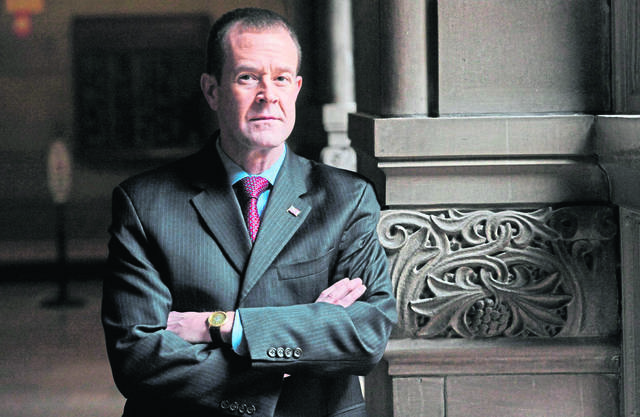The Pennsylvania Court of Judicial Discipline on Wednesday suspended Allegheny County Common Pleas Judge Mark V. Tranquilli without pay effective immediately and has scheduled his trial on allegations of judicial misconduct to begin on Oct. 5.
Tranquilli apologized in a letter to colleagues that was circulated this week.
In an order posted to the court’s website, the court noted that the trial will be conducted on an expedited basis.
The state Judicial Conduct Board referred six counts of misconduct against Tranquilli earlier this month, including that he engaged in “racial or other harassment,” failed to instill public confidence in the court, and brought disrepute to the bench.
The charges stem from four cases over which he presided during his time in both family and criminal court.
Tranquilli was assigned to administrative duties in February after allegations that he referred to a Black female juror in a criminal case that ended with acquittal as “Aunt Jemima.”
Judge John H. Foradora issued a dissenting statement in the order on Wednesday, arguing that the Judicial Conduct Board should not pursue an interim suspension unless criminal charges have been filed or criminal activity has occurred. Instead, he wrote, it should be up to the president judge in each district to handle assignment or suspension for a sitting judge prior to resolution with the Court of Judicial Discipline.
“In this case, the most severe sanction has been issued before the trial has occurred.”
In a letter Tranquilli addressed: “Dear Colleague,” the judge said he wanted to make the “first of many apologies.”
“I sincerely apologize for my irresponsible words and the pain caused to our community and courts,” he wrote.
Tranquilli said the complaint against him is “completely appropriate in the interests of transparency and accountability.
“It is my hope that this process will allow me to publicly accept the responsibility I have privately felt and to eventually regain your trust,” he wrote.
Tranquilli goes on in the letter to explain what he called the “events that resulted in the investigation and complaint.”
It was Jan. 24, and the jury had just returned a verdict in a drug case.
Tranquilli said that he invited the attorneys on the case into chambers to give them feedback and to share with them what the jurors had told him when he spoke with them at the conclusion of the case.
The conversation quickly turned to jury selection, Tranquilli said in the letter.
“Specifically, we discussed why the lawyers had selected certain jurors for the case, based upon the behaviors observed during the trial and comments the jurors shared afterwards,” he wrote.
Tranquilli explained in the letter that there were two Black female jurors sitting next to each other, and when one of the attorneys asked which one he was referring to, Tranquilli said he indicated, “the one ‘with the Aunt Jemima’ on her head. I focused on an article of clothing that we could all see to distinguish between the two adjacent jurors.”
Tranquilli said he could not recall the word “kerchief” at the time.
“While I did not, at any time, refer to the juror as ‘Aunt Jemima,’ a fact corroborated by a polygraph examination I passed during the investigation, the use of that term was nonetheless wrong.”
During the same discussion, Tranquilli continued in his letter, he noted that one juror appeared to be glaring at the prosecutor during his closing.
“In an insensitive attempt to make a possible explanation for this perceived hostility, I said that you would think the juror ‘had a brother or baby-daddy at home, dealing drugs.’”
In his letter, Tranquilli said that, “In retrospect, my words were pejorative and offensive — in any context.”
He said he should have known better and done better.
“I am truly sorry I said them and for the harm my words caused.”
Tranquilli said that he presided over 26 jury trials in 2019, most of which were sex offender cases.
“This case was my third back-to-back jury trial in January 2020 alone, and the third verdict returned late on a Friday,” he wrote. “Professionally and personally, I was physically, intellectually and emotionally spent.
“Otherwise, I would not have used such words.”
Then, Tranquilli addressed other allegations in the complaint against him, saying they are “predicated on my use of intemperate and insensitive language, which I unfortunately borrowed from popular culture and literature.”
Tranquilli said his words were intended to explain the court system in simpler terms and explain probation expectations.
Although he admits that he has fallen short of the standards expected of the judiciary, Tranquilli defends his record as a judge and former prosecutor, saying that he “sought justice vigorously, but even-handedly, for all, regardless of race, color or creed.”
He also said that his sentencing statistics show that Black defendants in his courtroom were sentenced more leniently than white defendants.
He closes the letter by writing, “I acknowledge and accept responsibility for where I have failed.
“I hope I am given the opportunity to regain your confidence… I should have done better. I have done better. I can do better in the future.”








